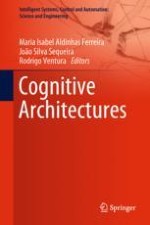2019 | OriginalPaper | Buchkapitel
Non-human Intention and Meaning-Making: An Ecological Theory
verfasst von : Michael A. R. Biggs
Erschienen in: Cognitive Architectures
Aktivieren Sie unsere intelligente Suche, um passende Fachinhalte oder Patente zu finden.
Wählen Sie Textabschnitte aus um mit Künstlicher Intelligenz passenden Patente zu finden. powered by
Markieren Sie Textabschnitte, um KI-gestützt weitere passende Inhalte zu finden. powered by
